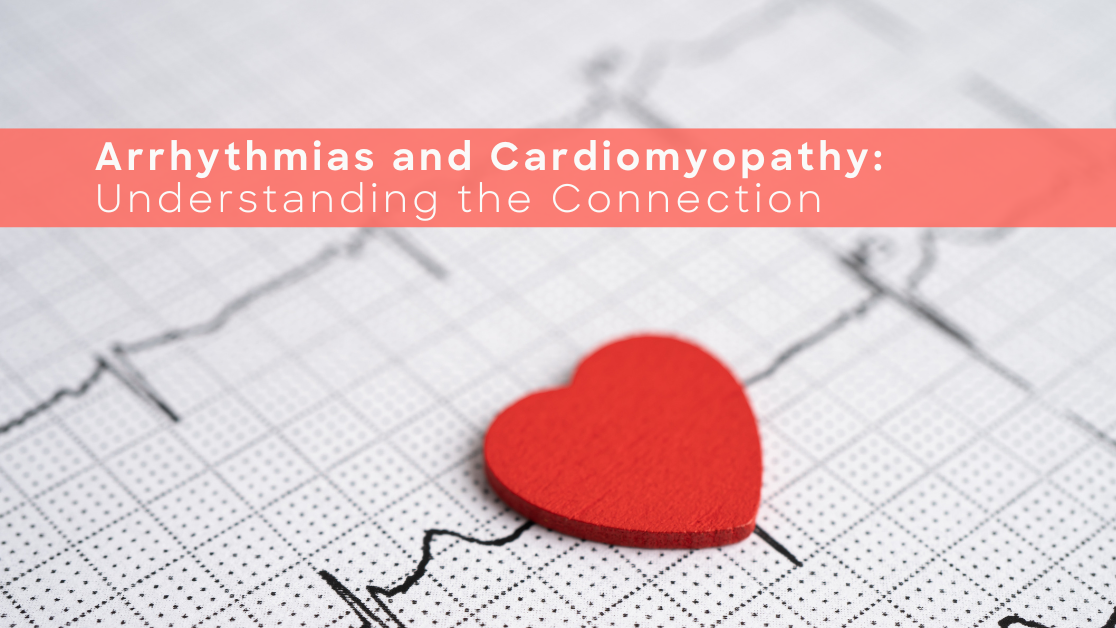
Understanding Arrhythmias and Cardiomyopathy
Two of the most common heart concerns people face today are arrhythmias and cardiomyopathy. These terms can sound intimidating—especially when you’re hearing them for the first time. But understanding what they mean (and how they’re connected) can make all the difference.
In this article, we’ll explore what arrhythmias and cardiomyopathy really are, how they’re connected, and the signs you should know to stay informed and take action early.
What Is an Arrhythmia?
An arrhythmia is a problem with the rhythm or rate of your heartbeat. In short, it means your heart may beat too fast, too slow, or irregularly.
Your heart has its own electrical system — like a natural pacemaker — that tells it when to beat. But sometimes, those signals misfire. And when they do, the result is an arrhythmia.
Common types of arrhythmias:
- Atrial fibrillation (AFib) – A fast, irregular heartbeat (the most common type)
- Bradycardia – A heartbeat that’s too slow
- Tachycardia – A heartbeat that’s too fast
- Premature beats – “Skipped” or extra beats that feel like fluttering or palpitations
Some arrhythmias are harmless and pass quickly. Others can lead to more serious issues, especially if they go unnoticed or untreated. According to the American Heart Association, early detection and management of heart rhythm disorders are essential to reducing the risk of serious complications such as stroke and heart failure.
What Is Cardiomyopathy?
Cardiomyopathy is a disease of the heart muscle. It affects how well your heart pumps blood to the rest of your body. Over time, the heart muscle may become thicker, weaker, or stiff, making it harder for your heart to do its job.
There are several types of cardiomyopathy, including:
- Hypertrophic cardiomyopathy (HCM) – When the heart muscle becomes abnormally thick
- Dilated cardiomyopathy (DCM) – When the heart chambers enlarge and weaken
- Restrictive cardiomyopathy (RCM) – When the heart becomes stiff and less flexible
Cardiomyopathy often develops slowly, and symptoms may be easy to ignore at first. But catching it early makes a big difference.
How Are Arrhythmias and Cardiomyopathy Connected?
Up to 30–50% of patients with cardiomyopathy may experience some form of arrhythmia during their lifetime, according to research published in the Journal of the American College of Cardiology. This is because changes in the heart muscle can disrupt the electrical signals that keep your heartbeat steady.
The connection between arrhythmias and cardiomyopathy goes both ways:
- Cardiomyopathy can cause arrhythmias. When the heart muscle is damaged or abnormally structured, it can interfere with the heart’s normal electrical signals.
- Arrhythmias can worsen cardiomyopathy. An irregular heartbeat can make the heart work harder or less efficiently, potentially weakening the muscle even more.
That’s why if you’re diagnosed with one, your doctor might check for the other. Understanding this connection can help guide treatment and prevent complications in the future.
Symptoms You Shouldn’t Ignore
One of the challenges with arrhythmias and cardiomyopathy is that their symptoms often show up slowly.
Fatigue, dizziness, even a racing heart can be easy to dismiss as stress, dehydration, or just a “busy day.” But when these signs keep coming back, they may be your heart’s way of saying something’s not right.
Here are some symptoms to watch for:
- Fluttering or “racing” heartbeat
- Shortness of breath, especially with mild activity or even no activity
- Dizziness or lightheadedness
- Fatigue that doesn’t go away
- Fainting or near-fainting
- Chest pain or pressure
- Swelling in the legs, ankles, or feet
If something feels off and it’s happening repeatedly, it’s worth a conversation with your doctor.
What to Expect During Diagnosis
If your doctor suspects an arrhythmia or cardiomyopathy, they may recommend a few non-invasive tests to better understand how your heart is functioning:
- ECG (electrocardiogram): A quick and painless test that measures your heart’s electrical activity and can detect irregular rhythms.
- Holter monitor or wearable device: These track your heart rhythm over a few days while you’re doing normal activities to catch intermittent issues that a brief ECG might miss.
- Echocardiogram: An ultrasound of the heart that helps your doctor see its size, structure, and how well it’s pumping.
- Genetic testing: If there's a family history of cardiomyopathy, genetic testing can help identify inherited forms of the condition.
Many people manage these conditions well with medication, lifestyle changes, or in some cases, procedures or devices (like pacemakers or defibrillators).
Don’t Wait to Take the First Step
Whether you’ve felt strange heartbeats, unexplained fatigue, or have a family history of heart disease — the most important thing is not to ignore it. Because when it comes to your heart, knowledge really is power.
Join our community for real stories, new research, and everyday tips to keep your heart strong.
Disclosure
*This content is for informational purposes only and should not be taken as medical advice. Always consult your healthcare team for guidance specific to your condition.*
References
Journal of the American College of Cardiology. (2021). Arrhythmia burden in patients with cardiomyopathy: A clinical overview. Retrieved from https://www.jacc.org/doi/full/10.1016/j.jacc.2021.01.001
American Heart Association. (n.d.). Arrhythmia information. Retrieved June 21, 2025, from https://www.heart.org/en/health-topics/arrhythmia
American Heart Association. (n.d.). Cardiomyopathy. Retrieved June 21, 2025, from https://www.heart.org/en/health-topics/cardiomyopathy